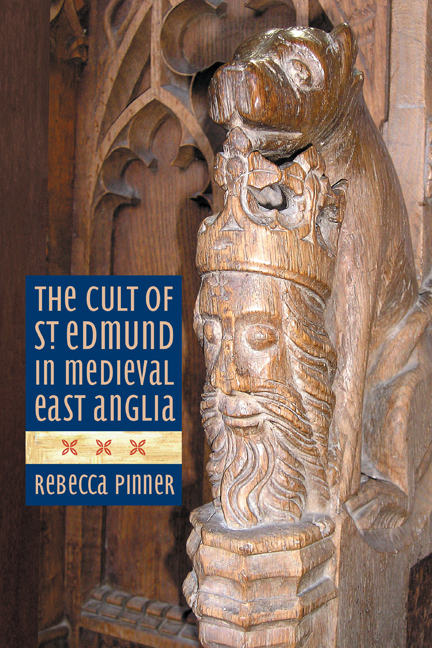Book contents
- Frontmatter
- Contents
- List of Illustrations
- Acknowledgements
- Abbreviations
- Introduction
- Part I Texts and Contexts: the Legend of St Edmund
- Part II Relics, Shrines and Pilgrimage: Encountering St Edmund at Bury
- Part III Beyond Bury: Dissemination and Appropriation
- Conclusion: ‘Martir, Mayde and Kynge’, and More
- Appendix 1 Synoptic Account of the Legend of St Edmund
- Appendix 2 Chronology of Significant Events and Texts Associated with the Cult of St Edmund
- Bibliography
- Index
Chapter 5 - The Final Flourish of the Textual Cult: John Lydgate, The Lives of Sts Edmund and Fremund
Published online by Cambridge University Press: 21 May 2021
- Frontmatter
- Contents
- List of Illustrations
- Acknowledgements
- Abbreviations
- Introduction
- Part I Texts and Contexts: the Legend of St Edmund
- Part II Relics, Shrines and Pilgrimage: Encountering St Edmund at Bury
- Part III Beyond Bury: Dissemination and Appropriation
- Conclusion: ‘Martir, Mayde and Kynge’, and More
- Appendix 1 Synoptic Account of the Legend of St Edmund
- Appendix 2 Chronology of Significant Events and Texts Associated with the Cult of St Edmund
- Bibliography
- Index
Summary
JOHN Lydgate (c. 1370–1449) was a monk in the abbey at Bury St Edmunds, which he had entered in his youth and to which he returned in the early 1430s following several periods of clerical and ecclesiastical service, including acting as the unofficial poet for the Lancastrian regime. Lydgate's Lives of Sts Edmund and Fremund is the culmination of the medieval hagiographic tradition concerning St Edmund, yet to date it has received surprisingly little critical interest, especially within the context of the St Edmund tradition. At 3,693 lines it is one of the longest versions produced and, written largely in rhyme royal stanzas, is the first rendering of the legend into English verse. Three of the manuscripts are also extensively illustrated. One of these, now British Library, Harley 2278 (also referred to hereafter as ‘the presentation copy’), was prepared as a gift for Henry VI and is one of the most sumptuous English manuscripts to survive from the fifteenth century. It is lavishly illustrated with 120 high-quality miniatures which provide a unique visual parallel to the text and offer a further opportunity to examine how St Edmund was simultaneously presented in differing media.
Lydgate's life is a sophisticated and elaborate rendering of the legend, interesting in its own right for the insight it offers into how the cult of one of the most popular devotional figures of the Middle Ages developed over time. Lydgate describes his poem as a ‘translacion’, immediately locating it within the medieval hagiographic tradition concerning Edmund. Anthony Edwards suggests that Lydgate's primary source is likely to have been MS Bodley 240. However, Lydgate does not specify his source. Instead he refers rather vaguely to ‘the noble story’ (I. 81, 190), his ‘auctours’ (I. 428) or most frequently simply to ‘the story’. Close reading reveals that the Lives is far more than a simple rendering into English of one text and is in fact extremely complex in its intertextual indebtedness, with Lydgate drawing on a variety of additional sources. Some passages are also his own inventions: for example the Prologues (Prologue, 1–80; I. 81–234); his references to contemporary issues and events such as the ‘lollardis’ (I. 1014); and, perhaps most interestingly, details of Edmund's battle with the Danes (II. 365–95).
- Type
- Chapter
- Information
- The Cult of St Edmund in Medieval East Anglia , pp. 89 - 112Publisher: Boydell & BrewerPrint publication year: 2015



